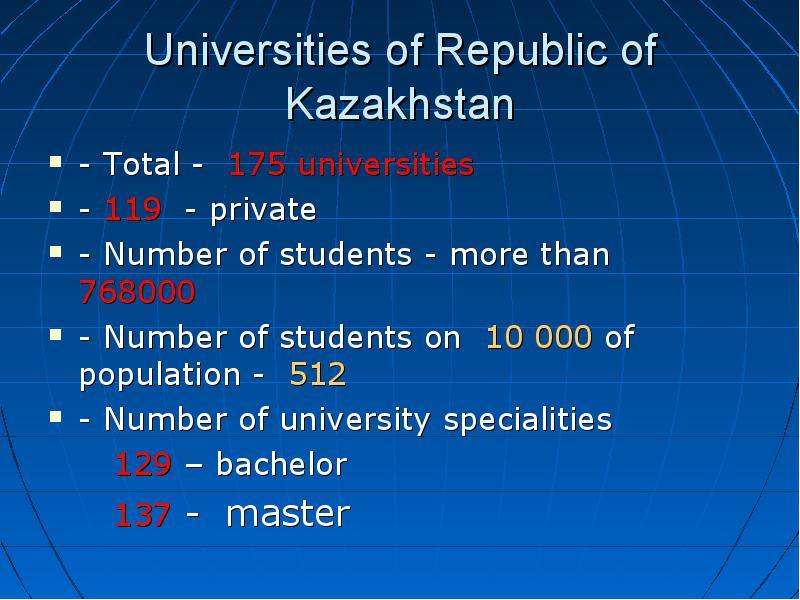
ПЗ 45: «Kazakhstan. Higher Education»
Give short information about your own university using the table.

Read the text and summarize it.
There are four levels of tertiary education in Kazakhstan: ·Bachelor Degree. The Bachelor degree in Kazakhstan typically spans four years or eight full semesters for full-time students. These basic higher education degrees provide students with the required fundamentals specific to their chosen field of study. ·Specialist Degree. The Specialist degree or diploma, which generally spans five years in duration, includes specialized education that is a bit more intensive than the normal Bachelor degree. ·Masters Degree. Scientific-pedagogical education in Kazakhstan can lead to a Master’s degree, which typically spans an additional two years in duration after the Bachelor or Specialist degree. ·Doctoral Degree. Doctoral degrees, leading to the Doctor of Science or PhD degree, can span anywhere from two too five years after the Master’s degree. Full-time postgraduate studies (known in Kazakhstan as Aspirantura) that lead to the qualification of Candidate of Sciences (Kandidat Nauk) normally last for three years, and the submission of a thesis is required. Under the new system of higher education, a PhD is conferred after two to three years' further study beyond the Master's Degree, while the Doctor of Sciences (Doktor Nauk) is awarded after the Kandidat Nauk and after completion of a thesis based on original research. Universities in Kazakhstan are typically headed up by a rector, appointed by the President of the nation, who wields considerable authority over the institution, approving all decisions including those regarding curriculum, personnel, and admission. This chain of command makes the universities in Kazakhstan much more centralized than their Western counterparts. As of this writing, the top two universities in Kazakhstan are al-Farabi Kazakh National University in Almaty and L. N. Gumilyov Eurasian National University located in Astana. Karaganda State University is also well-regarded. Private universities also make up part of the tertiary educational landscape of Kazakhstan. These schools, usually non-profit institutions, are subject to the same regulations regarding curriculum but are free to set tuition and salaries as they see fit. Public universities are subject to the same regulations as other government-owned organs, regarding not only fees and salaries, but also administrative structure, contracting and subcontracting, and ownership of property. State owned universities receive funding if their enrollment reaches 86,000 students or 34%.
A small number of universities are financed through a budget line in the Republic budget, such as art academies or international universities.
